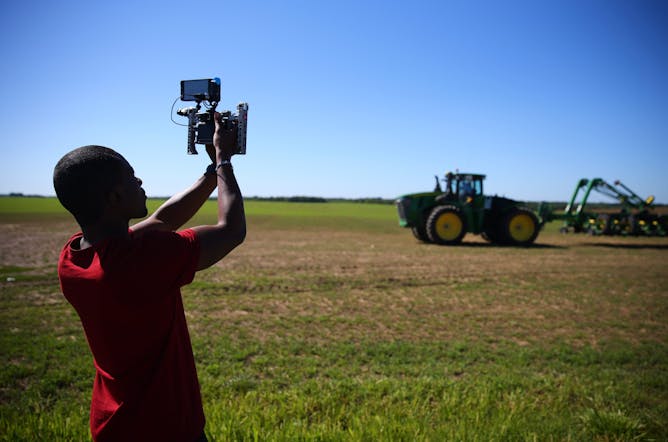|
School is out! The words may be sweet for children, yet sometimes met with trepidation by parents. This year, families are still navigating the effects of the pandemic, from COVID-19 infections to carrying ongoing concerns about how everyone is doing socially, psychologically and developmentally after lockdowns and pandemic weirdness. With younger children whose schooling has been interrupted, parents may be wondering about the best ways to support what kids need.
Today in The Conversation Canada, Kimberly Hillier of University of Windsor writes about how parents could think about nurturing early literacy skills at home. Her suggestions focus on doing this in ways that don’t place heavy expectations on the domestic responsibilities of parents, often mothers, that have already intensified during the pandemic.
She also discusses the importance of parents and children sharing finding moments of togetherness through the summer. She writes that nurturing early literacy can look like talking about letters, signs and logos you see while riding a city bus with your child. But it can also look like enlisting help to wash the dishes, where the art of conversation and growth in independence can take root.
Also today:
|

|
Susannah Schmidt
Education + Arts Editor
|
|

Cognitive skills related to overall reading success can be nurtured by engaging in activities that develop social skills and positive self-regulation.
(Shutterstock)
Kimberly Hillier, University of Windsor
Cognitive skills related to early literacy can be nurtured this summer by engaging in activities that develop social-emotional skills and positive self-regulation.
|

Mississaugas of the New Credit First Nation children play in water sprinklers during National Indigenous Peoples Day celebrations in Mississauga, Ont., on June 21, 2022.
THE CANADIAN PRESS/Nathan Denette
Anne Levesque, L’Université d’Ottawa/University of Ottawa; Malorie Kanaan, L’Université d’Ottawa/University of Ottawa
Under international law, children have the right to be heard in legal proceedings directly or indirectly affecting them. Canada must step up to ensure all human rights apply to kids as they do adults.
|

A new study on Canada’s affordability crisis has found that visible minorities have less access to affordable housing than whites in Canada.
(Shutterstock)
Kate Choi, Western University; Sagi Ramaj, University of Toronto
Ensuring visible minorities have equitable access to affordable housing is an important step in fulfilling the National Housing Strategy’s goal to make affordable housing available to all Canadians.
|

Smart technology is demonstrated on a farm in Newark, Mo.
(Dilip Vishwanat/AP Images/U.S. Cellular)
Kelly Bronson, L’Université d’Ottawa/University of Ottawa
Big data from social media have been revealed as biased, but we should also pay attention to agriculture firms whose play for big data is likely to have detrimental environmental and social impacts.
|

Reconsidering the rules of the game may help prevent concussions and other injuries.
(John Woods/Rugby Canada)
Stephen West, University of Calgary
Girls’ rugby is a sport with higher than expected concussion rates. As the sport grows in popularity, preventing concussions is more effective than treating them.
|

Secondary market research is the first key step in developing good marketplace intelligence.
(Shutterstock)
Philippe Massiera, Université du Québec à Montréal (UQAM)
The market research stage is often criticized as useless and inappropriate, but it’s essential a success business.
|
La Conversation Canada
|

Parmi les mesures qui permettront de réduire l’impact carbone des constructions, on retrouve l’utilisation de matériaux de construction biosourcés, comme le bois.
(Shutterstock)
Luciano Rodrigues Viana, Université du Québec à Chicoutimi (UQAC); Alejandra Zaga Mendez, Université Laval; Jean-François Bissonnette, Université Laval; Jean-François Boucher, Université du Québec à Chicoutimi (UQAC)
Dans le contexte actuel d’urgence climatique, il importe de réduire les émissions de GES. Dans le secteur de la construction, une solution potentielle serait de préconiser l’utilisation du bois.
|
Ukraine Invasion
|
-
Stephen Hall, University of Bath
The road to EU membership is usually a long process, sometimes taking decades.
-
Cecilia Bellora, CEPII; Kevin Lefebvre, CEPII; Malte Thie, CEPII
Four months since the start of invasion, the European Union has already adopted six sanction packages. Room for manoeuvre is shrinking.
|
|
Arts
|
-
Catherine Speck, University of Adelaide
Pure Form at the Art Gallery of South Australia brings together some of Japan’s most interesting post-war art.
|
|
Environment + Energy
|
-
Arne Tobian, Stockholm University; Dieter Gerten, Potsdam Institute for Climate Impact Research; Lan Wang Erlandsson, Stockholm University
‘Green water’ is essential for healthy soils and a benign climate, but it’s under threat.
|
|
Politics
|
-
Carlos Diaz Ruiz, Hanken School of Economics
Why do people believe conspiracies like flat-Earth theory? An expert explains.
|
|
|
|
| |
| |
| |
| |
|
|